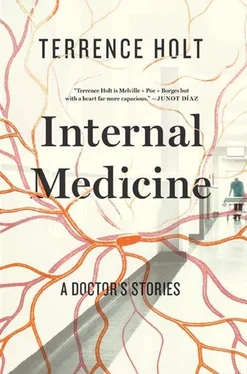The next day we were on call again, the cycle starting to feel unbearably compressed. When the PA announced a code at the start of rounds we ran, but it was a sore, hobbling kind of progress we made, Alex and the intern and the medical student and I traversing the length of the hospital and up the old main stairwell to 5 West, where we found the usual melee in progress. Owing to our slow pace on the stairs (at the fourth floor we stopped running), the MICU team had gotten there first. From the doorway, over the crowd of nurses, techs, and assorted hysterics, I couldn’t even see the patient: just the rhythmic up-and-down of whoever was doing compressions. The MICU team waved us off. We walked slowly back to the CCU.
Marie’s room was crowded when we reached it on our rounds, three or four figures gathered at the bedside, their backs screening her from us as we stood outside the door. At a glance they were clearly nonmedical, probably family, and I tried to shut the door before I presented her, but after thirty years the doors in the CCU do not close. So I presented the data on Marie in a low monotone that no one but the attending could hear. No one else was paying much attention, the fellow and Alex fiddling with the radiology monitors, the intern slumped in her morning fog, the med student staring at his clipboard as though it held portents of his own impending death. There was little to report. Her ins and outs had been barely negative overnight, and her creatinine continued to climb. The Swann numbers were a random sprinkling of figures that I reported without conviction. As I trailed off, the attending simply shook her head, and swept into the room.
A laugh was ringing through the air as we intruded on the bedside, the sound of it bouncing unnervingly loud off the walls. A woman at Marie’s right elbow straightened, pushing back a stray curl, and smiled at us, a bright, airline hostess’s smile. She turned to Marie.
“Your doctors are here, honey. We’ll just be going along.”
“I’d like you to stay,” the attending said, and turned to Marie. “We need to have a conversation.”
Marie, floating in the bed like some enormous whipped dessert, gestured weakly at the two women at her sides. From somewhere on the peripheries, a pale, balding man wearing a failed comb-over and muted checked trousers shyly waved.
“Have you met my girls?” Marie asked.
“Not yet,” the attending said, holding out a hand to the one nearest, the one who had called Marie “honey.” “I’m Dr. Sparrow,” she said.
“Jeanine Wright.” She took the hand and they held hands briefly. “We’re her girls.” The woman at the opposite elbow nodded assent, but her gaze remained on Marie, a fixed, mournful expression I had seen before.
“Do you need us for something?” Jeanine said.
The attending, her lips thin, nodded. “I think Marie may.” She turned. “Marie.”
Marie looked up at her from the bed, the tremor that always inhabited her jowls momentarily quite pronounced and then still.
“How do you feel?”
Marie gazed back at the attending. For a long moment the two of them looked at each other.
Her voice came out with a husky sound. “Like it’s time to go, Doctor.”
The attending nodded. She reached out and took Marie’s hand. “Do you need more people to come?”
Marie heaved her gaze around toward the mournful woman on her left. “Did you talk to David?”
The sad eyes lifted. “He said he’d be here tonight.”
“And Ralphie?”
“Tomorrow.”
Marie settled back, shifted around to the attending. “Do I have tomorrow?”
The attending lifted Marie’s hand slightly, moved it gently side to side, then set it back down. “I think so.”
Marie subsided into the bed. “I’ll be here,” she said, and then her voice rose in a thin husk of a laugh. “If I’m not anywhere else.”
The girls at her elbows laughed too, bright bell-like voices breaking out of them, washing over us in our rumpled whites in a wave of human sound.
The code that morning seemed to have disturbed the rhythm of the day. The emergency room was quiet for once, the cath lab down for maintenance. The whirlwind of admitting fell strangely still. I had time to see my patients.
I left her for last, skipping over the alcoholic cardiomyopathy whose snores were audible from the door.
Her girls were still there when I entered, the two of them bending over the bed (the bed itself raised to elbow height because Marie, as she had observed, wasn’t getting out of it, and the nurses prefer not to stoop). The checked trousers were cross-legged in the room’s sole chair, nodding pleasantly at me as I entered.
“Doctor,” Marie said, as I came around the foot of the bed. “Have you met my girls?”
I held out my hand to Jeanine, who took it in a brief, soft clasp, then reached across the bed to the quiet one. “Francie,” she murmured, an apologetic smile. Her eyes were red.
Jeanine turned to Marie. “We met your doctors this morning, remember?”
“Not this one,” she said. “He’s the quiet one.” She turned to me and her jowls creased in a conspiratorial smile. “Aren’t you?”
“I suppose so,” I said, suddenly very shy.
Marie turned to her girls. “This is the one I was telling you about. My morning buddy. Aren’t you?” The same sly grin. “He’s the one comes in to squeeze my knee.”
The girls tittered. I could feel heat spreading over my face.
Jeanine, clearly the responsible one in the party, shushed her. “You’re embarrassing him, Mother.”
Marie peered at me. “Why, honey, you’re right. I never dreamed doctors could blush.”
Jeanine attempted to rescue the situation. “Mother says you’re very nice.”
A distinct pain stung me, centered in no anatomical structure I could specify. “Your mom’s been nice, too,” I replied.
We all stood there. Thinking about the tense I’d just assigned Marie, no doubt.
“She’s been telling us how hard you all have been working.”
Marie stirred, a proprietorial pride in her voice. “This one never sleeps.”
The girls made clucking noises as Marie expanded. “I see him out there all hours of the day and night. The nurses tell me he has a family, but I don’t think he ever sees them. Do you?”
“Do you have a family, Doctor?” Jeanine asked. I nodded. Additional questioning elicited the snapshots I kept in my pocket. Marie reached out an eager hand.
“Oh, they’re beautiful boys,” she cooed. “Look at that one, Jeanine. He looks just like Roger. Doesn’t he look like Roger, Francie, when he was little? Right down to the drool on the chin.” Uproarious laughter, and I realized Roger was the name of the checked trousers. “Come here, Roger, and tell us if this little boy doesn’t look like you.” Roger, shyer even than I, joined us at the bedside. “What’s his name, Doctor?” Marie asked.
There is a boundary I don’t cross over with patients. I don’t mind showing pictures of my kids: over and above the fact that I’m fond of my children, I’ve found that showing their pictures can humanize an otherwise awful situation. It’s useful. But I don’t tell their names. It’s a privacy issue, basic protection of hearth and home. But there’s also a primal superstition at work. Naming calls. To use the names of my children in the CCU would somehow connect them to this world and what goes on here. That’s where I draw the line.
But not that day. I told Marie their names, the names I withhold from this account, and she made the appropriate sounds, repeating them, identifying each in turn. The girls agreed they were sweet boys, and their names were lovely names. From which point it was impossible to proceed with the conversation I had come in to hold: just when and how Marie should die. But I proceeded anyway.
Читать дальше












